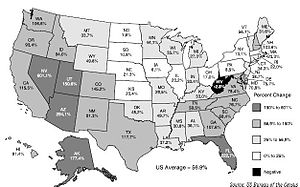 |
| English: Population Change 1960-2000 by state PD map by US Census Bureau, scanned (Photo credit: Wikipedia) |
Happy New Year Everybody.
I can't believe that 2013 is history. Time for those resolutions.
In the meantime, here are some population facts from the Census Bureau:
Census Bureau Projects U.S. Population of 317.3 Million on New Year’s Day ─ As our nation prepares to begin the new year, the U.S. Census Bureau today projected that on Jan. 1, 2014, the United States population will be 317,297,938. This represents an increase of 2,218,622, or 0.7 percent, from New Year’s Day 2013.
In January 2014, one birth is expected to occur every 8 seconds in the United States and one death every 12 seconds.
The projected world population on Jan. 1, 2014, is 7,137,577,750, an increase of 77,630,563, or 1.1 percent from New Year’s Day 2013. In January 2014, 4.3 births and 1.8 deaths are expected worldwide every second. India added 15.6 million people over the one-year period, which led all countries, followed by China, Nigeria, Pakistan and Ethiopia.

































